Abortion and Christian Ethics Essay 2022
VerifiedAdded on 2022/10/18
|7
|1972
|8
Essay
AI Summary
Contribute Materials
Your contribution can guide someone’s learning journey. Share your
documents today.
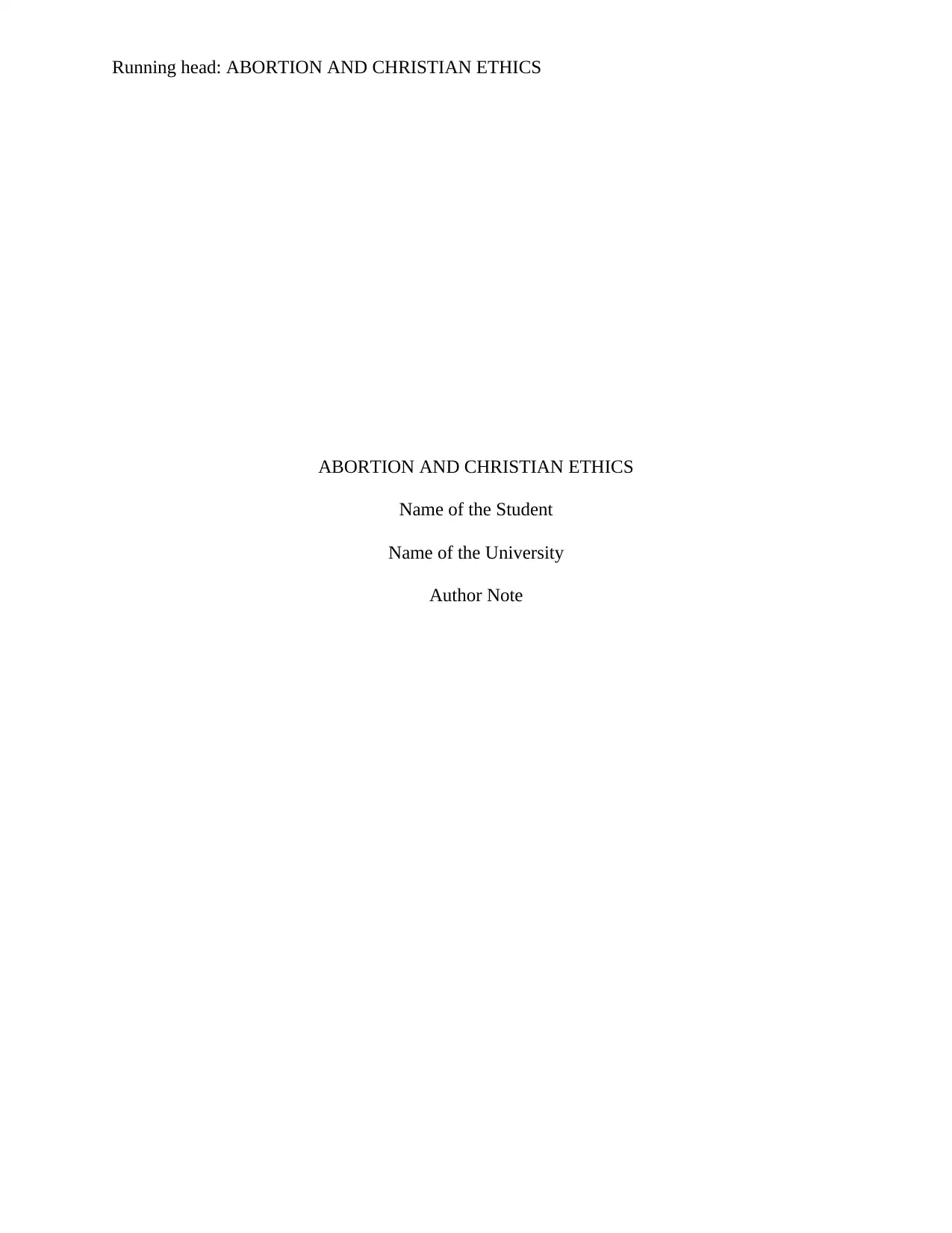
Running head: ABORTION AND CHRISTIAN ETHICS
ABORTION AND CHRISTIAN ETHICS
Name of the Student
Name of the University
Author Note
ABORTION AND CHRISTIAN ETHICS
Name of the Student
Name of the University
Author Note
Secure Best Marks with AI Grader
Need help grading? Try our AI Grader for instant feedback on your assignments.
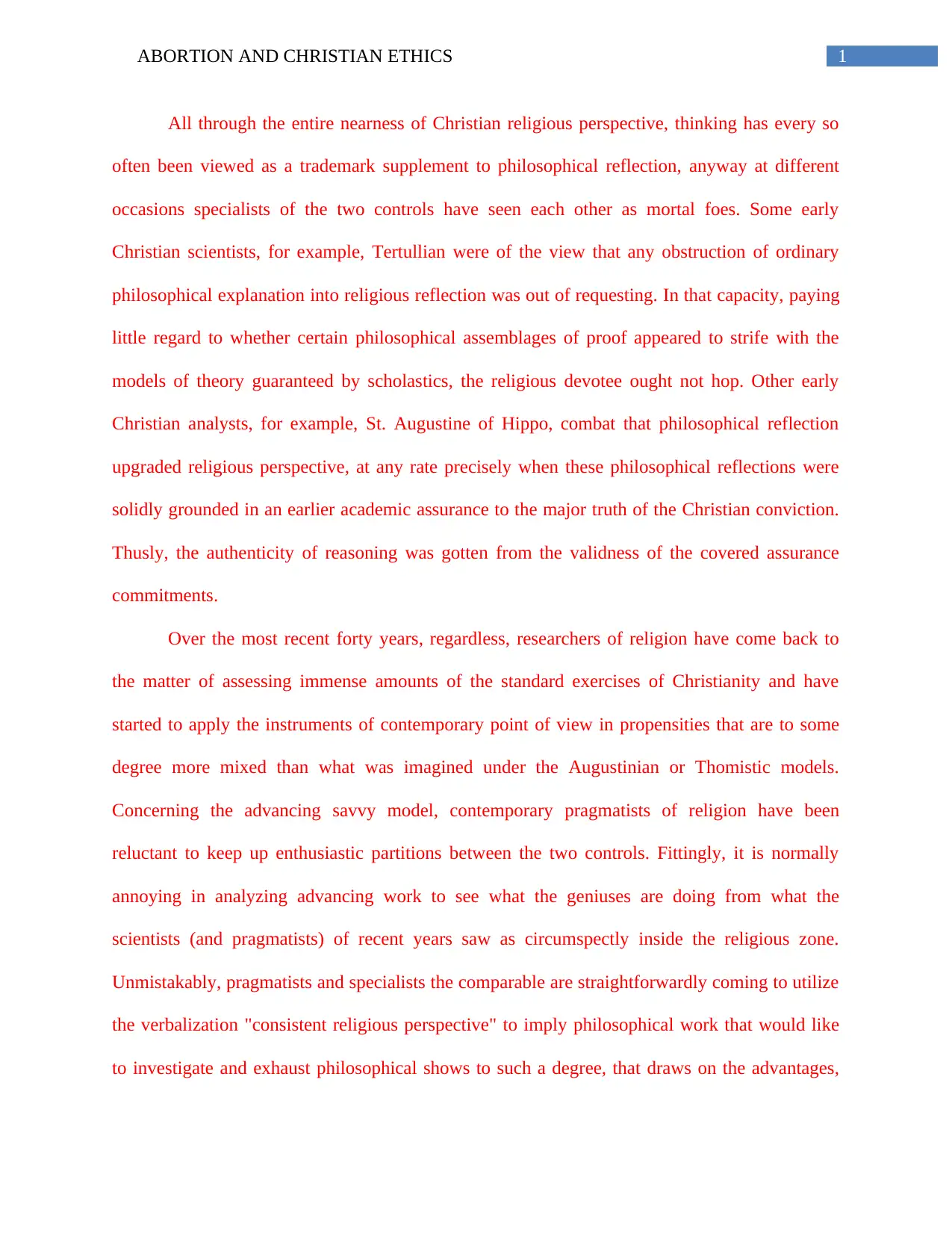
1ABORTION AND CHRISTIAN ETHICS
All through the entire nearness of Christian religious perspective, thinking has every so
often been viewed as a trademark supplement to philosophical reflection, anyway at different
occasions specialists of the two controls have seen each other as mortal foes. Some early
Christian scientists, for example, Tertullian were of the view that any obstruction of ordinary
philosophical explanation into religious reflection was out of requesting. In that capacity, paying
little regard to whether certain philosophical assemblages of proof appeared to strife with the
models of theory guaranteed by scholastics, the religious devotee ought not hop. Other early
Christian analysts, for example, St. Augustine of Hippo, combat that philosophical reflection
upgraded religious perspective, at any rate precisely when these philosophical reflections were
solidly grounded in an earlier academic assurance to the major truth of the Christian conviction.
Thusly, the authenticity of reasoning was gotten from the validness of the covered assurance
commitments.
Over the most recent forty years, regardless, researchers of religion have come back to
the matter of assessing immense amounts of the standard exercises of Christianity and have
started to apply the instruments of contemporary point of view in propensities that are to some
degree more mixed than what was imagined under the Augustinian or Thomistic models.
Concerning the advancing savvy model, contemporary pragmatists of religion have been
reluctant to keep up enthusiastic partitions between the two controls. Fittingly, it is normally
annoying in analyzing advancing work to see what the geniuses are doing from what the
scientists (and pragmatists) of recent years saw as circumspectly inside the religious zone.
Unmistakably, pragmatists and specialists the comparable are straightforwardly coming to utilize
the verbalization "consistent religious perspective" to imply philosophical work that would like
to investigate and exhaust philosophical shows to such a degree, that draws on the advantages,
All through the entire nearness of Christian religious perspective, thinking has every so
often been viewed as a trademark supplement to philosophical reflection, anyway at different
occasions specialists of the two controls have seen each other as mortal foes. Some early
Christian scientists, for example, Tertullian were of the view that any obstruction of ordinary
philosophical explanation into religious reflection was out of requesting. In that capacity, paying
little regard to whether certain philosophical assemblages of proof appeared to strife with the
models of theory guaranteed by scholastics, the religious devotee ought not hop. Other early
Christian analysts, for example, St. Augustine of Hippo, combat that philosophical reflection
upgraded religious perspective, at any rate precisely when these philosophical reflections were
solidly grounded in an earlier academic assurance to the major truth of the Christian conviction.
Thusly, the authenticity of reasoning was gotten from the validness of the covered assurance
commitments.
Over the most recent forty years, regardless, researchers of religion have come back to
the matter of assessing immense amounts of the standard exercises of Christianity and have
started to apply the instruments of contemporary point of view in propensities that are to some
degree more mixed than what was imagined under the Augustinian or Thomistic models.
Concerning the advancing savvy model, contemporary pragmatists of religion have been
reluctant to keep up enthusiastic partitions between the two controls. Fittingly, it is normally
annoying in analyzing advancing work to see what the geniuses are doing from what the
scientists (and pragmatists) of recent years saw as circumspectly inside the religious zone.
Unmistakably, pragmatists and specialists the comparable are straightforwardly coming to utilize
the verbalization "consistent religious perspective" to imply philosophical work that would like
to investigate and exhaust philosophical shows to such a degree, that draws on the advantages,
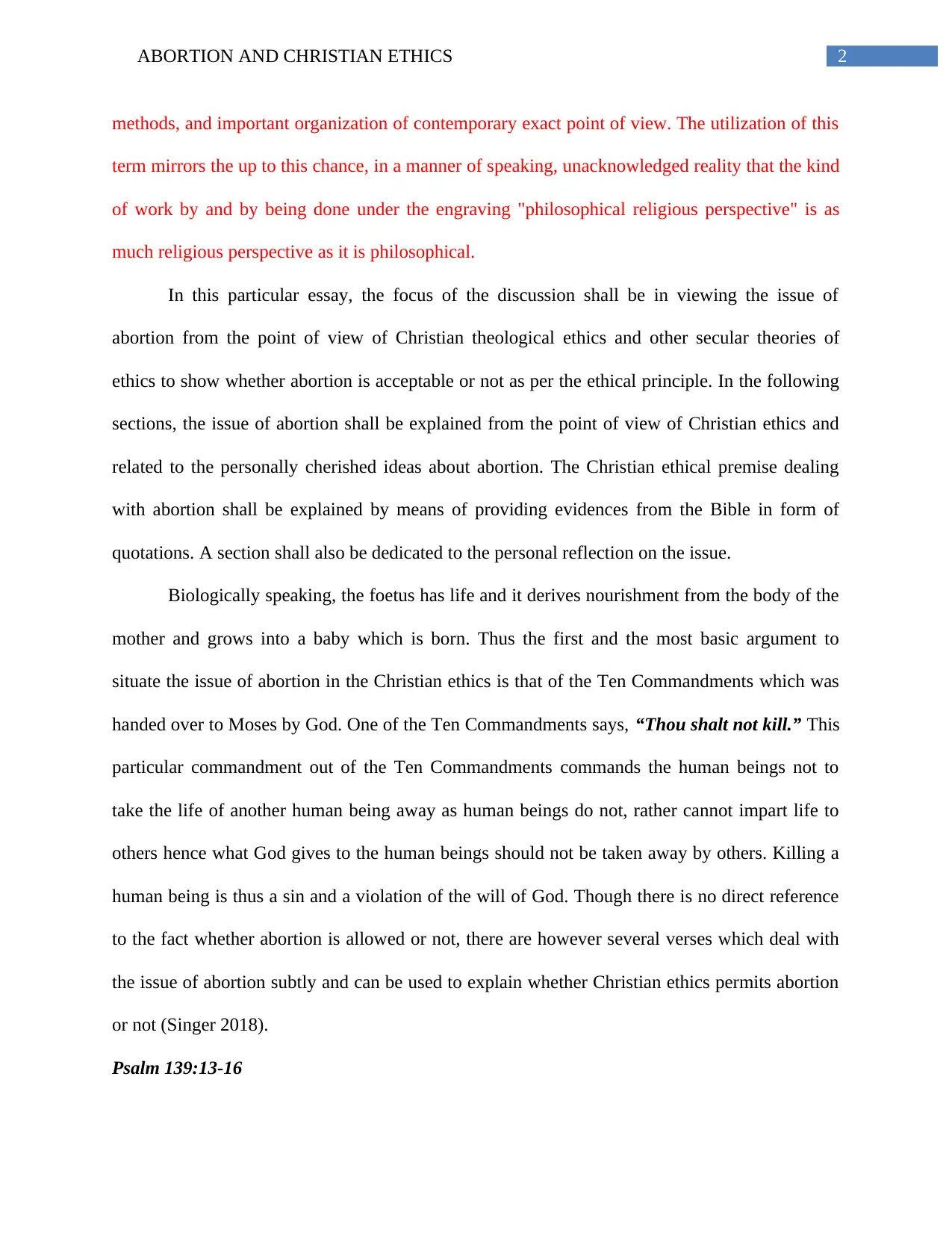
2ABORTION AND CHRISTIAN ETHICS
methods, and important organization of contemporary exact point of view. The utilization of this
term mirrors the up to this chance, in a manner of speaking, unacknowledged reality that the kind
of work by and by being done under the engraving "philosophical religious perspective" is as
much religious perspective as it is philosophical.
In this particular essay, the focus of the discussion shall be in viewing the issue of
abortion from the point of view of Christian theological ethics and other secular theories of
ethics to show whether abortion is acceptable or not as per the ethical principle. In the following
sections, the issue of abortion shall be explained from the point of view of Christian ethics and
related to the personally cherished ideas about abortion. The Christian ethical premise dealing
with abortion shall be explained by means of providing evidences from the Bible in form of
quotations. A section shall also be dedicated to the personal reflection on the issue.
Biologically speaking, the foetus has life and it derives nourishment from the body of the
mother and grows into a baby which is born. Thus the first and the most basic argument to
situate the issue of abortion in the Christian ethics is that of the Ten Commandments which was
handed over to Moses by God. One of the Ten Commandments says, “Thou shalt not kill.” This
particular commandment out of the Ten Commandments commands the human beings not to
take the life of another human being away as human beings do not, rather cannot impart life to
others hence what God gives to the human beings should not be taken away by others. Killing a
human being is thus a sin and a violation of the will of God. Though there is no direct reference
to the fact whether abortion is allowed or not, there are however several verses which deal with
the issue of abortion subtly and can be used to explain whether Christian ethics permits abortion
or not (Singer 2018).
Psalm 139:13-16
methods, and important organization of contemporary exact point of view. The utilization of this
term mirrors the up to this chance, in a manner of speaking, unacknowledged reality that the kind
of work by and by being done under the engraving "philosophical religious perspective" is as
much religious perspective as it is philosophical.
In this particular essay, the focus of the discussion shall be in viewing the issue of
abortion from the point of view of Christian theological ethics and other secular theories of
ethics to show whether abortion is acceptable or not as per the ethical principle. In the following
sections, the issue of abortion shall be explained from the point of view of Christian ethics and
related to the personally cherished ideas about abortion. The Christian ethical premise dealing
with abortion shall be explained by means of providing evidences from the Bible in form of
quotations. A section shall also be dedicated to the personal reflection on the issue.
Biologically speaking, the foetus has life and it derives nourishment from the body of the
mother and grows into a baby which is born. Thus the first and the most basic argument to
situate the issue of abortion in the Christian ethics is that of the Ten Commandments which was
handed over to Moses by God. One of the Ten Commandments says, “Thou shalt not kill.” This
particular commandment out of the Ten Commandments commands the human beings not to
take the life of another human being away as human beings do not, rather cannot impart life to
others hence what God gives to the human beings should not be taken away by others. Killing a
human being is thus a sin and a violation of the will of God. Though there is no direct reference
to the fact whether abortion is allowed or not, there are however several verses which deal with
the issue of abortion subtly and can be used to explain whether Christian ethics permits abortion
or not (Singer 2018).
Psalm 139:13-16
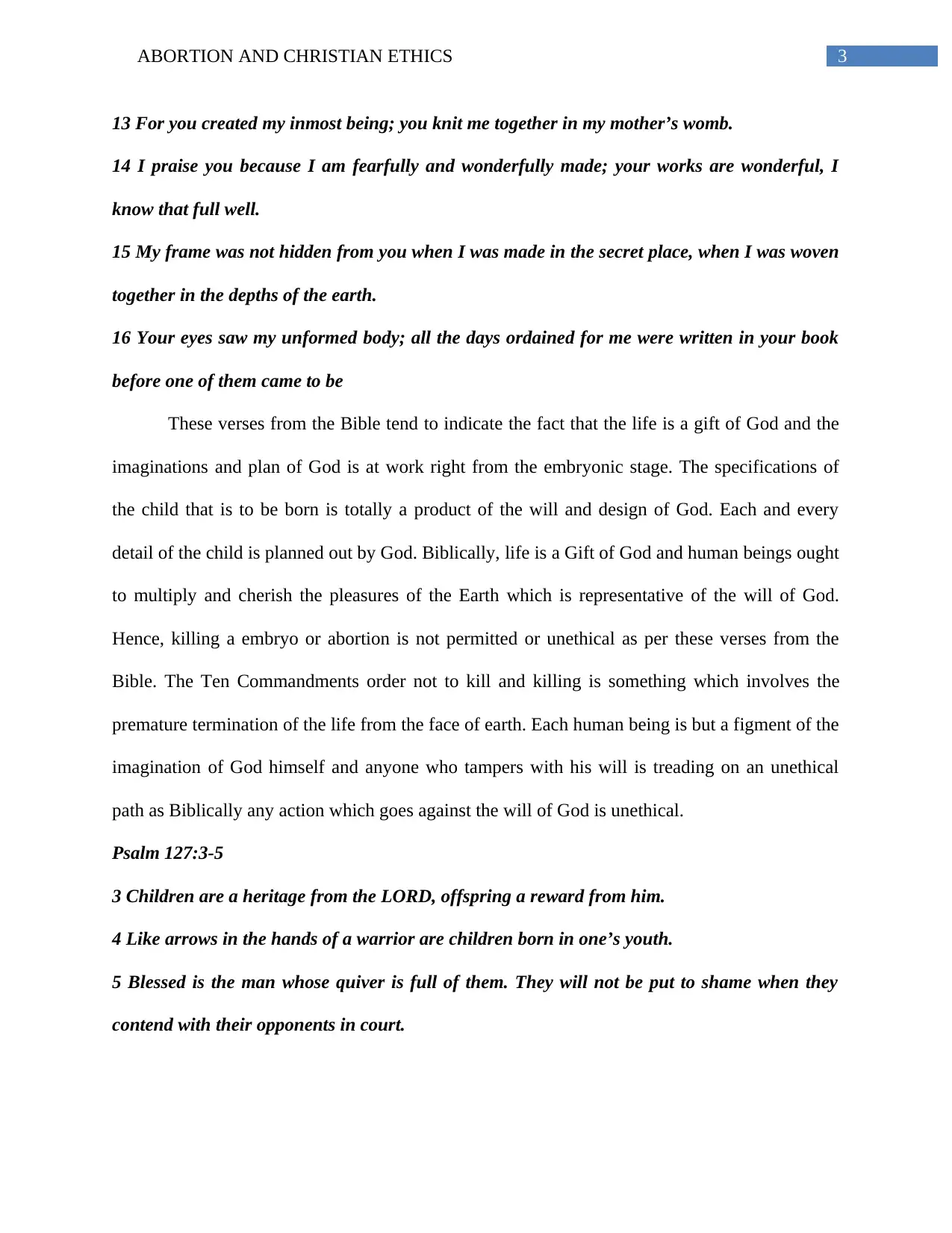
3ABORTION AND CHRISTIAN ETHICS
13 For you created my inmost being; you knit me together in my mother’s womb.
14 I praise you because I am fearfully and wonderfully made; your works are wonderful, I
know that full well.
15 My frame was not hidden from you when I was made in the secret place, when I was woven
together in the depths of the earth.
16 Your eyes saw my unformed body; all the days ordained for me were written in your book
before one of them came to be
These verses from the Bible tend to indicate the fact that the life is a gift of God and the
imaginations and plan of God is at work right from the embryonic stage. The specifications of
the child that is to be born is totally a product of the will and design of God. Each and every
detail of the child is planned out by God. Biblically, life is a Gift of God and human beings ought
to multiply and cherish the pleasures of the Earth which is representative of the will of God.
Hence, killing a embryo or abortion is not permitted or unethical as per these verses from the
Bible. The Ten Commandments order not to kill and killing is something which involves the
premature termination of the life from the face of earth. Each human being is but a figment of the
imagination of God himself and anyone who tampers with his will is treading on an unethical
path as Biblically any action which goes against the will of God is unethical.
Psalm 127:3-5
3 Children are a heritage from the LORD, offspring a reward from him.
4 Like arrows in the hands of a warrior are children born in one’s youth.
5 Blessed is the man whose quiver is full of them. They will not be put to shame when they
contend with their opponents in court.
13 For you created my inmost being; you knit me together in my mother’s womb.
14 I praise you because I am fearfully and wonderfully made; your works are wonderful, I
know that full well.
15 My frame was not hidden from you when I was made in the secret place, when I was woven
together in the depths of the earth.
16 Your eyes saw my unformed body; all the days ordained for me were written in your book
before one of them came to be
These verses from the Bible tend to indicate the fact that the life is a gift of God and the
imaginations and plan of God is at work right from the embryonic stage. The specifications of
the child that is to be born is totally a product of the will and design of God. Each and every
detail of the child is planned out by God. Biblically, life is a Gift of God and human beings ought
to multiply and cherish the pleasures of the Earth which is representative of the will of God.
Hence, killing a embryo or abortion is not permitted or unethical as per these verses from the
Bible. The Ten Commandments order not to kill and killing is something which involves the
premature termination of the life from the face of earth. Each human being is but a figment of the
imagination of God himself and anyone who tampers with his will is treading on an unethical
path as Biblically any action which goes against the will of God is unethical.
Psalm 127:3-5
3 Children are a heritage from the LORD, offspring a reward from him.
4 Like arrows in the hands of a warrior are children born in one’s youth.
5 Blessed is the man whose quiver is full of them. They will not be put to shame when they
contend with their opponents in court.
Secure Best Marks with AI Grader
Need help grading? Try our AI Grader for instant feedback on your assignments.
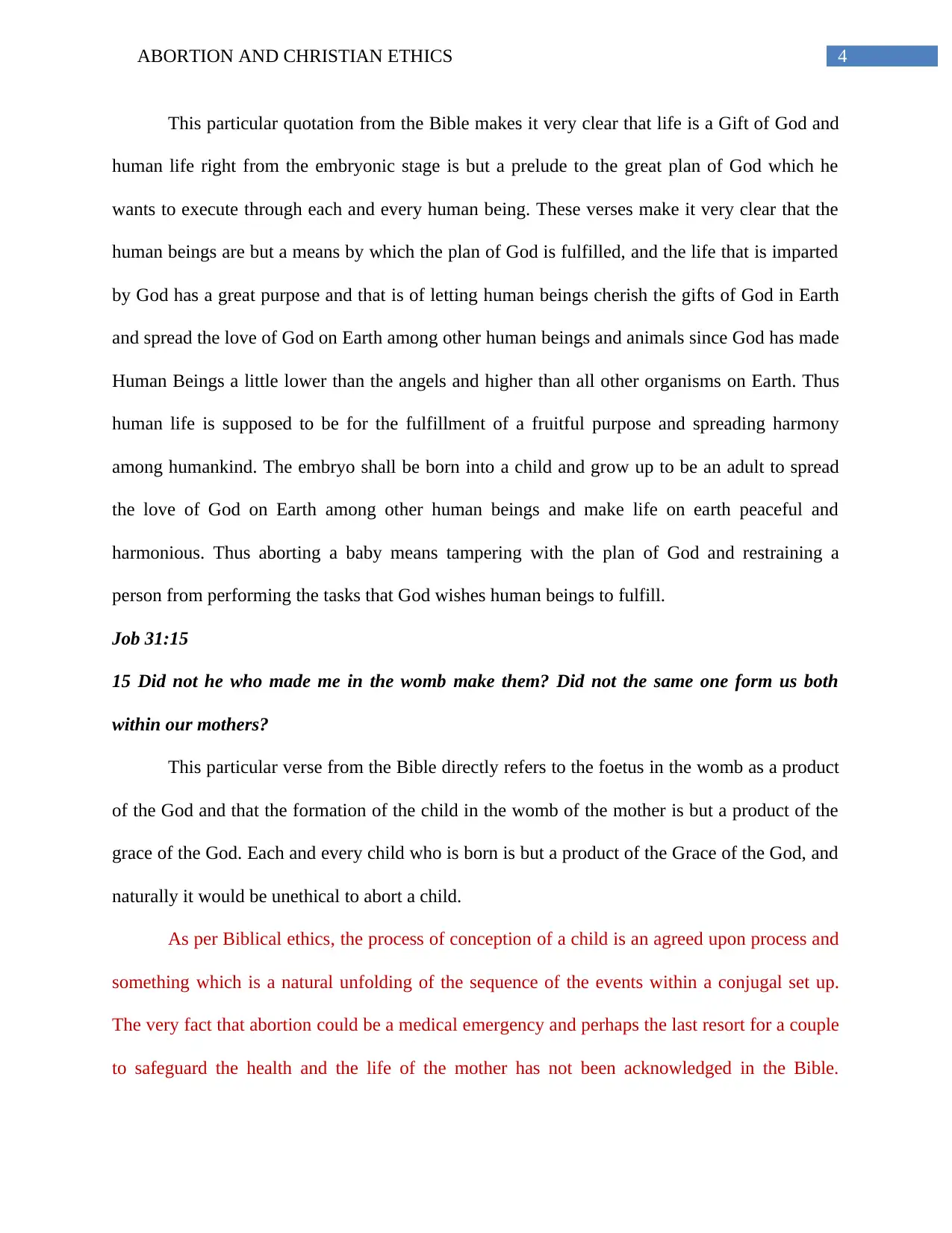
4ABORTION AND CHRISTIAN ETHICS
This particular quotation from the Bible makes it very clear that life is a Gift of God and
human life right from the embryonic stage is but a prelude to the great plan of God which he
wants to execute through each and every human being. These verses make it very clear that the
human beings are but a means by which the plan of God is fulfilled, and the life that is imparted
by God has a great purpose and that is of letting human beings cherish the gifts of God in Earth
and spread the love of God on Earth among other human beings and animals since God has made
Human Beings a little lower than the angels and higher than all other organisms on Earth. Thus
human life is supposed to be for the fulfillment of a fruitful purpose and spreading harmony
among humankind. The embryo shall be born into a child and grow up to be an adult to spread
the love of God on Earth among other human beings and make life on earth peaceful and
harmonious. Thus aborting a baby means tampering with the plan of God and restraining a
person from performing the tasks that God wishes human beings to fulfill.
Job 31:15
15 Did not he who made me in the womb make them? Did not the same one form us both
within our mothers?
This particular verse from the Bible directly refers to the foetus in the womb as a product
of the God and that the formation of the child in the womb of the mother is but a product of the
grace of the God. Each and every child who is born is but a product of the Grace of the God, and
naturally it would be unethical to abort a child.
As per Biblical ethics, the process of conception of a child is an agreed upon process and
something which is a natural unfolding of the sequence of the events within a conjugal set up.
The very fact that abortion could be a medical emergency and perhaps the last resort for a couple
to safeguard the health and the life of the mother has not been acknowledged in the Bible.
This particular quotation from the Bible makes it very clear that life is a Gift of God and
human life right from the embryonic stage is but a prelude to the great plan of God which he
wants to execute through each and every human being. These verses make it very clear that the
human beings are but a means by which the plan of God is fulfilled, and the life that is imparted
by God has a great purpose and that is of letting human beings cherish the gifts of God in Earth
and spread the love of God on Earth among other human beings and animals since God has made
Human Beings a little lower than the angels and higher than all other organisms on Earth. Thus
human life is supposed to be for the fulfillment of a fruitful purpose and spreading harmony
among humankind. The embryo shall be born into a child and grow up to be an adult to spread
the love of God on Earth among other human beings and make life on earth peaceful and
harmonious. Thus aborting a baby means tampering with the plan of God and restraining a
person from performing the tasks that God wishes human beings to fulfill.
Job 31:15
15 Did not he who made me in the womb make them? Did not the same one form us both
within our mothers?
This particular verse from the Bible directly refers to the foetus in the womb as a product
of the God and that the formation of the child in the womb of the mother is but a product of the
grace of the God. Each and every child who is born is but a product of the Grace of the God, and
naturally it would be unethical to abort a child.
As per Biblical ethics, the process of conception of a child is an agreed upon process and
something which is a natural unfolding of the sequence of the events within a conjugal set up.
The very fact that abortion could be a medical emergency and perhaps the last resort for a couple
to safeguard the health and the life of the mother has not been acknowledged in the Bible.
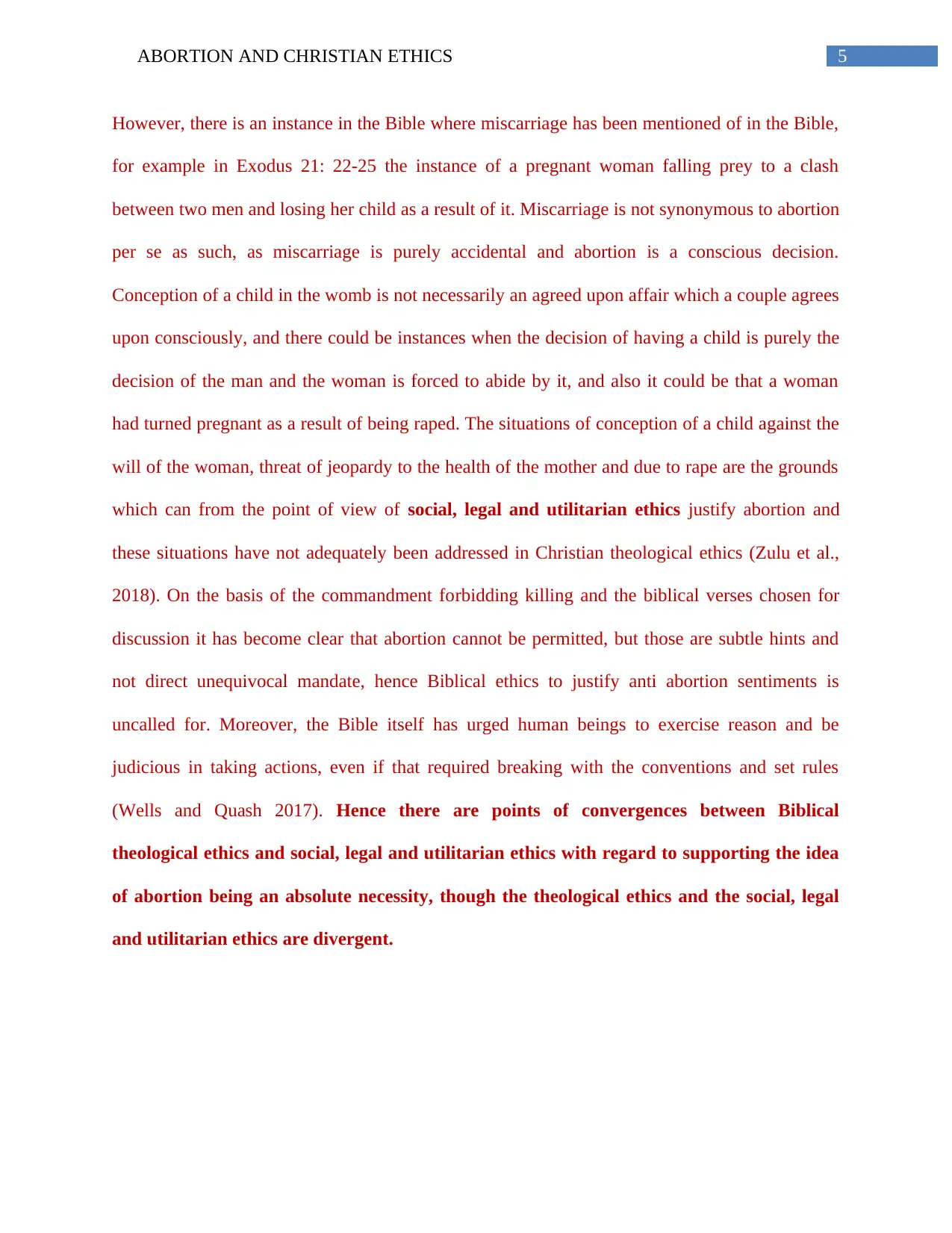
5ABORTION AND CHRISTIAN ETHICS
However, there is an instance in the Bible where miscarriage has been mentioned of in the Bible,
for example in Exodus 21: 22-25 the instance of a pregnant woman falling prey to a clash
between two men and losing her child as a result of it. Miscarriage is not synonymous to abortion
per se as such, as miscarriage is purely accidental and abortion is a conscious decision.
Conception of a child in the womb is not necessarily an agreed upon affair which a couple agrees
upon consciously, and there could be instances when the decision of having a child is purely the
decision of the man and the woman is forced to abide by it, and also it could be that a woman
had turned pregnant as a result of being raped. The situations of conception of a child against the
will of the woman, threat of jeopardy to the health of the mother and due to rape are the grounds
which can from the point of view of social, legal and utilitarian ethics justify abortion and
these situations have not adequately been addressed in Christian theological ethics (Zulu et al.,
2018). On the basis of the commandment forbidding killing and the biblical verses chosen for
discussion it has become clear that abortion cannot be permitted, but those are subtle hints and
not direct unequivocal mandate, hence Biblical ethics to justify anti abortion sentiments is
uncalled for. Moreover, the Bible itself has urged human beings to exercise reason and be
judicious in taking actions, even if that required breaking with the conventions and set rules
(Wells and Quash 2017). Hence there are points of convergences between Biblical
theological ethics and social, legal and utilitarian ethics with regard to supporting the idea
of abortion being an absolute necessity, though the theological ethics and the social, legal
and utilitarian ethics are divergent.
However, there is an instance in the Bible where miscarriage has been mentioned of in the Bible,
for example in Exodus 21: 22-25 the instance of a pregnant woman falling prey to a clash
between two men and losing her child as a result of it. Miscarriage is not synonymous to abortion
per se as such, as miscarriage is purely accidental and abortion is a conscious decision.
Conception of a child in the womb is not necessarily an agreed upon affair which a couple agrees
upon consciously, and there could be instances when the decision of having a child is purely the
decision of the man and the woman is forced to abide by it, and also it could be that a woman
had turned pregnant as a result of being raped. The situations of conception of a child against the
will of the woman, threat of jeopardy to the health of the mother and due to rape are the grounds
which can from the point of view of social, legal and utilitarian ethics justify abortion and
these situations have not adequately been addressed in Christian theological ethics (Zulu et al.,
2018). On the basis of the commandment forbidding killing and the biblical verses chosen for
discussion it has become clear that abortion cannot be permitted, but those are subtle hints and
not direct unequivocal mandate, hence Biblical ethics to justify anti abortion sentiments is
uncalled for. Moreover, the Bible itself has urged human beings to exercise reason and be
judicious in taking actions, even if that required breaking with the conventions and set rules
(Wells and Quash 2017). Hence there are points of convergences between Biblical
theological ethics and social, legal and utilitarian ethics with regard to supporting the idea
of abortion being an absolute necessity, though the theological ethics and the social, legal
and utilitarian ethics are divergent.
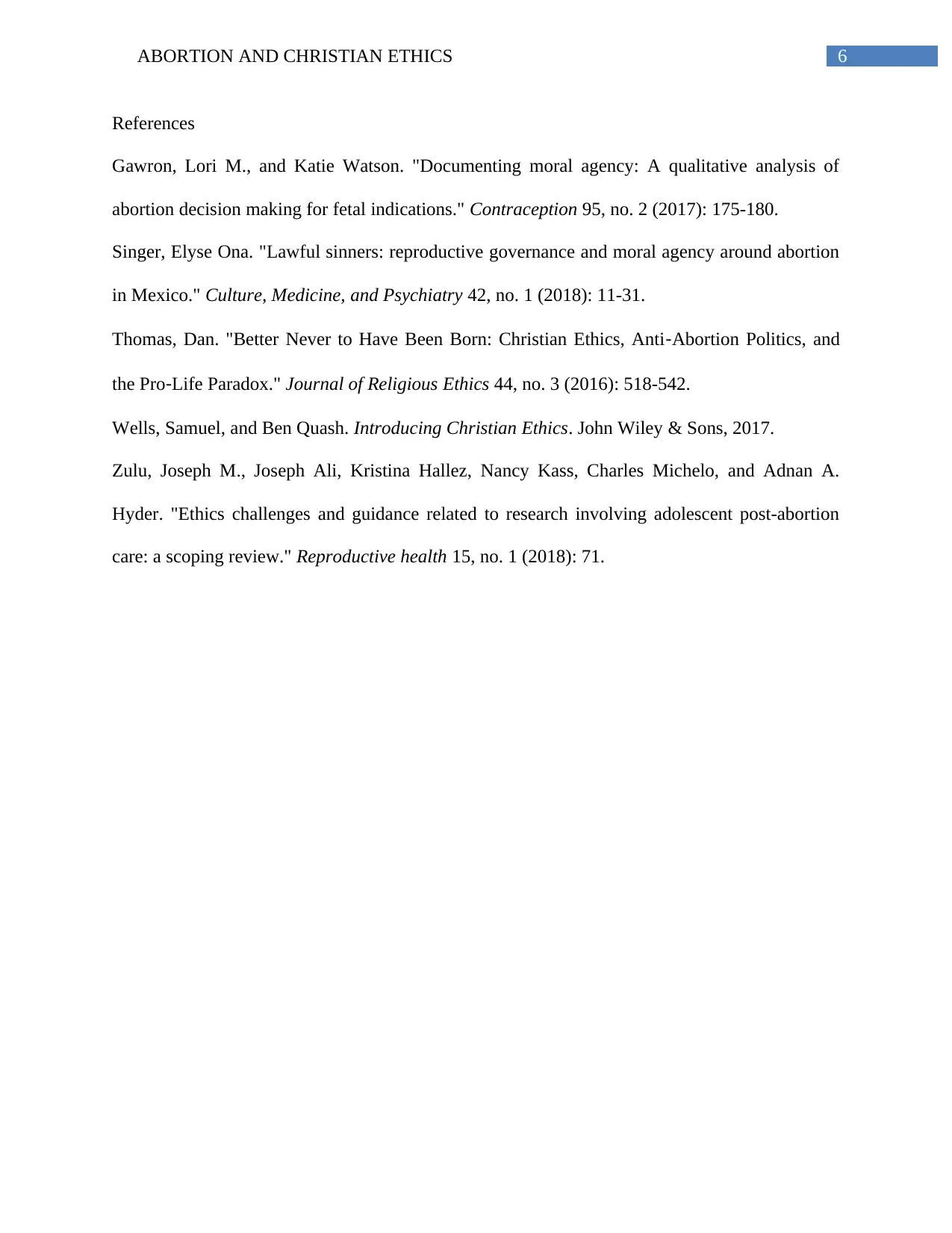
6ABORTION AND CHRISTIAN ETHICS
References
Gawron, Lori M., and Katie Watson. "Documenting moral agency: A qualitative analysis of
abortion decision making for fetal indications." Contraception 95, no. 2 (2017): 175-180.
Singer, Elyse Ona. "Lawful sinners: reproductive governance and moral agency around abortion
in Mexico." Culture, Medicine, and Psychiatry 42, no. 1 (2018): 11-31.
Thomas, Dan. "Better Never to Have Been Born: Christian Ethics, Anti‐Abortion Politics, and
the Pro‐Life Paradox." Journal of Religious Ethics 44, no. 3 (2016): 518-542.
Wells, Samuel, and Ben Quash. Introducing Christian Ethics. John Wiley & Sons, 2017.
Zulu, Joseph M., Joseph Ali, Kristina Hallez, Nancy Kass, Charles Michelo, and Adnan A.
Hyder. "Ethics challenges and guidance related to research involving adolescent post-abortion
care: a scoping review." Reproductive health 15, no. 1 (2018): 71.
References
Gawron, Lori M., and Katie Watson. "Documenting moral agency: A qualitative analysis of
abortion decision making for fetal indications." Contraception 95, no. 2 (2017): 175-180.
Singer, Elyse Ona. "Lawful sinners: reproductive governance and moral agency around abortion
in Mexico." Culture, Medicine, and Psychiatry 42, no. 1 (2018): 11-31.
Thomas, Dan. "Better Never to Have Been Born: Christian Ethics, Anti‐Abortion Politics, and
the Pro‐Life Paradox." Journal of Religious Ethics 44, no. 3 (2016): 518-542.
Wells, Samuel, and Ben Quash. Introducing Christian Ethics. John Wiley & Sons, 2017.
Zulu, Joseph M., Joseph Ali, Kristina Hallez, Nancy Kass, Charles Michelo, and Adnan A.
Hyder. "Ethics challenges and guidance related to research involving adolescent post-abortion
care: a scoping review." Reproductive health 15, no. 1 (2018): 71.
1 out of 7
Your All-in-One AI-Powered Toolkit for Academic Success.
+13062052269
info@desklib.com
Available 24*7 on WhatsApp / Email
![[object Object]](/_next/static/media/star-bottom.7253800d.svg)
Unlock your academic potential
© 2024 | Zucol Services PVT LTD | All rights reserved.